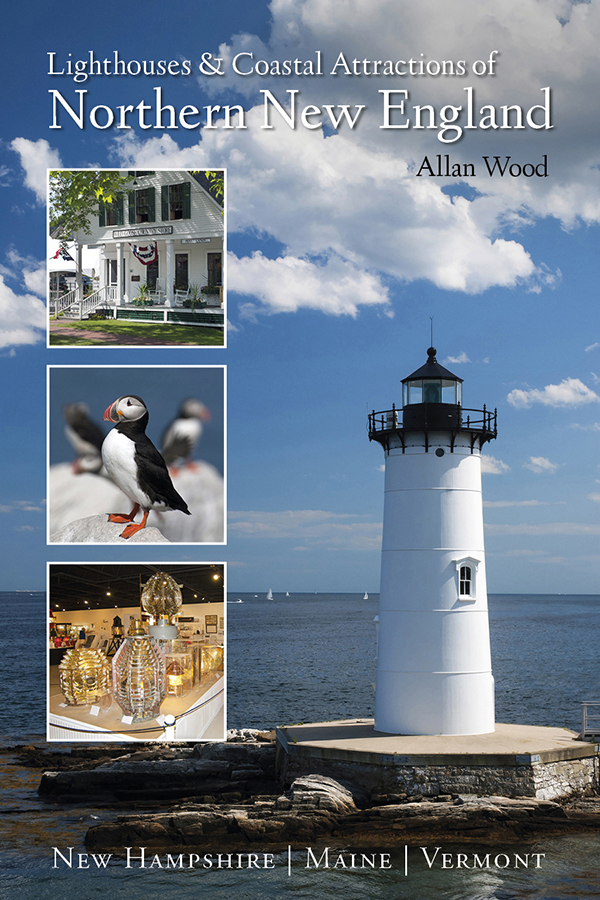Doubling Point Range Lights
(Kennebec River Range Lights)

Arrowsic, Maine
Built in 1898
Location:
Northeast end of Arrowsic Island, on the Kennebec River. Private residence. Best to view from one of the boat tours out of Boothbay Harbor.
Latitude: 43° 52' 58" N
Longitude: 69° 48' 25" W
Historic Stories:
In 1894, the Percy & Small Shipyard started building wooden ships in Bath, Maine. It became the epicenter of wooden commercial shipbuilding in New England. The shipyard specialized in building large wooden sailing schooners called “downeasters” to haul coal primarily from the Mid-Atlantic states through New England into Canada. In the early 1900s, Maine shipyards produced nine of the ten original six-masted sailing schooners, which became the largest sailing vessels in the world. Seven of these giants would be built at the Percy & Small Shipyard.
Note: For more historic details about shipbuilding in New England, select the "Building the Largest Sailing Ships" Blog link to be directed to my section of lighthouse stories.
The Kennebec River Range Lights, or Doubling Point Range Lights as they are referred to, were established on Arrowsic island to mark an extreme double turn in the channel at what is known as Fiddler Reach.
| It is the only pair of active range lights in Maine with two towers with identical lights. |  |
A ship's captain would know that when the two light towers are aligned they are in the middle of the channel to make sure they were still on course.
On December 28, 1928 Keeper Captain Harry L. Nye made a rare rescue of four young men caught on a large ice floe that had broken away and was carrying them down the swift current of the Kennebec River out to sea. He made it out in time to reach them and bring them to safety.
In 1938, Lucy Mae Woodward, the young daughter of Keeper William H. Woodward, fell in the river near the keeper’s house and drowned despite frantic attempts to revive her by the local police and neighbors. Many believed that she might have suffered a slight heart attack that caused her to fall.

Doubling Point |
In 1990, the range lights became one of the last light stations in the United States to be automated. |
They are still used as navigational aids. The location is a private residence, where the keeper and his family also takes care of Doubling Point Light and Squirrel Point Light.
Places to Visit Nearby:
Historic Bath provides lots of specialty shops and galleries for visitors to explore.
| Visit the Maine Maritime Museum to explore and take in one their many types of lighthouse cruises and nature excursions. |  |
After crossing the huge Kennebec River Bridge in Bath, travel down 127 and you’ll find Doubling Point Road. Ask permission to explore the Doubling Point Lighthouse, and the Doubling Point Range Lights across the street.
The caretakers of the Doubling Point Light and Doubling Point Range Lights live on the side of the range lights.

Doubling Point |
There are nice views of the front range light overlooking the river. |
The Wiscasset, Waterville & Farmington Railway Museum is an operating, two-foot gauge steam railroad.
Driving Directions
-
Be wary this is a private residence, better views may be obtained from one of the many tours offered in the area.
-
From US Route 1 after you pass through Bath, cross over the bridge that goes over the Kennebec River
-
Take Route 127 South for nearly 2 miles till you come to a dirt road on the right with the sign that reads "Doubling Point Rd."
-
Proceed down the dirt road and take a left at the mailboxes (you're still on Doubling Point Rd)
-
Then bear left at the fork to reach Doubling Point Range Lights; if you bear right at the fork you will come upon the Doubling Point lighthouse.
-
Both of these lights are in a residential area and the people who live at these places will probably allow you to take photographs. Ask permission if you can.
-
The people who live at this residence maintain both properties and Squirrel Point Light.

Local Boat Tours
Boat cruises mentioned below offer many types of cruises. During specific lighthouse cruises, they may pass by Kennebec River (Doubling Point Range) Lights. They may also pass the lighthouse as part of charters, narrated wildlife and historic tours, and other types of excursions.
Maine Maritime Museum
Various lighthouse, nature, and Bath shipyard tours along the Kennebec River. Check out their lighthouse lantern tower room to see exactly what a lighthouse keeper would view.
243 Washington Street
Bath, ME 04530
Phone: (207) 443-1316
Fax: (207) 443-1665
Cap'n Fish's Whale Watch and Scenic Nature Cruises
Includes lighthouses along the Kennebec River and Boothbay Harbor.
Boothbay Harbor, Maine
(207)-633-3244
(207)-633-2626
Or toll free 1-800-636-3244
River Run Tours
You can charter this pontoon boat for lighthouse, fishing, and wildlife excursions.
River Run Tours, Inc.
28 Walnut Point
Woolwich, Maine 04578
(207) 504-BOAT(2628)
Maine Experience Guide Service
For those who prefer private chartered tours for small groups or just your family, join Captain Jay Farris as he provides personal lighthouse tours for up to eleven lighthouses in the Boothbay and Kennebec River regions, including the Kennebec River Range Lights. You can view these beacons along with local scenery and wildlife by boat, or hike to some.
Captain Jay Farris
23 Commercial St.
Bath ME 04530
Phone: (207) 215-3828
Books to Explore

Available in paperback. |
New England's Haunted Lighthouses: Explore the historical mysteries surrounding the haunted lighthouses of New England! This image-rich book features ghost stories about spirits of devoted keepers who linger, victims of foul play or local shipwrecks, ghost ships, lost souls, and more, blending maritime history with the supernatural. Explore the tales linked with these iconic beacons! |
Lighthouses and Coastal Attractions of Northern New England: This 300-page book (with over 360 images), provides human interest stories from each of the 76 lighthouses in northern New England, along with plenty of coastal attractions and tours near each beacon. Look inside! |
|

Available in paperback, hard cover, and as an eBook for all devices. |
The Rise and Demise of the Largest Sailing Ships: In the early 1900s, New England shipbuilders constructed the world’s largest sailing ships amid social and political reforms. These giants of sail were the ten original six-masted coal schooners and one colossal seven-masted vessel, built to carry massive quantities of coal and building supplies, and measured longer than a football field! In fact, most of these vessels were constructed a few miles down the Kennebec River in Bath, Maine. This book, balanced with plenty of color and vintage images, showcases the historical accounts that followed these mighty ships. |

